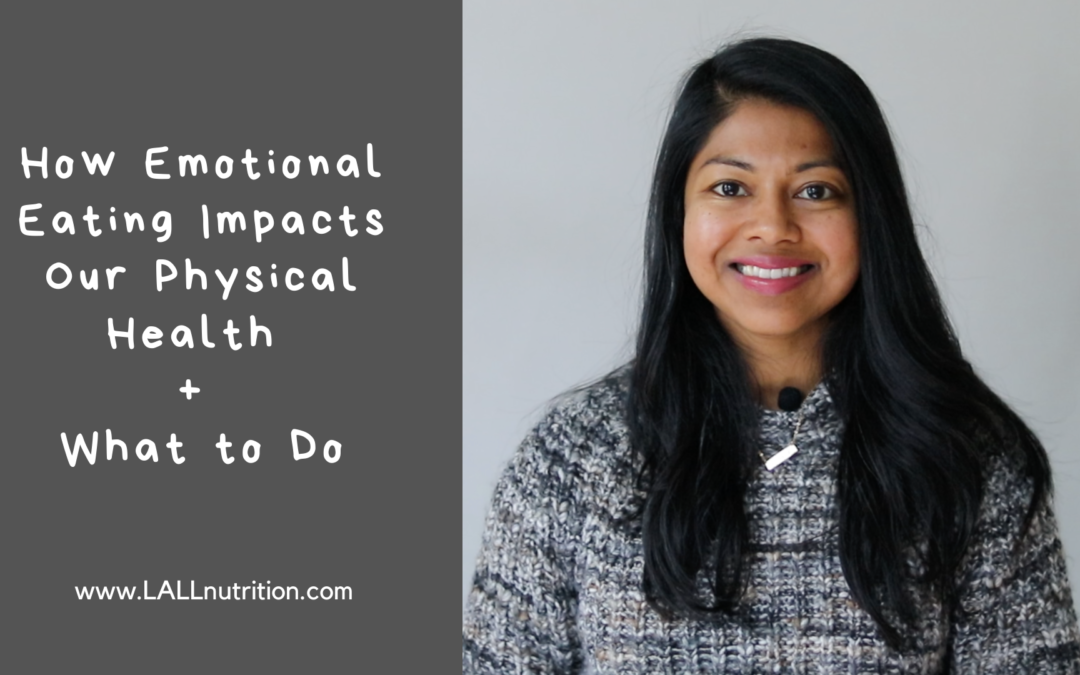Hello lovely,
Today I wanted to share about how emotions and emotional eating impact our physical health. If you are an emotional eater you know you go towards food when you’re feeling a certain way or you start eating out of the blue and then realize after you are completely out of control that you’ve binged.
With binging and emotional eating we might not notice how it’s impacting our health and physical body. So what happens when we eat, when we’re not truly hungry? There is true hunger and there is emotional hunger. When we eat when we’re not truly hungry, that means our body is not ready to digest food.
When we’re truly hungry our body secretes gastric juices and enzymes as it gets ready for food. When we eat out of emotional hunger, we’re just taking in food. We’re eating in a rush. We’re not chewing properly. We are not physically hungry so our bodies don’t want food. We’re eating a large amount of food. So we are going to feel bloated and heavy after that meal(s). We’re going to have chunks of food in our system because we inhaled the food.
It drains our body of energy trying to digest this food it didn’t need. This will impact our digestion and our digestive tract. It impacts our microbiome (our gut bacteria), because there are big chunks of food not being digested. These big pieces of food feed the bad bacteria in our gut. This creates neurotoxins that impact our brain because the gut and the brain are connected via the vagus nerve. They’re in constant communication and the neurotoxins can travel to the brain.
When we don’t feel good after we’ve binged it’s a combination of physically feeling off and these neurotoxins making us feel badly. We feel awful and may turn to food again and spiral. I just want to say that your willpower and your self-control is not the reason that this is happening. This is a much deeper issue.
How does emotional eating impact my physical health?
It is impacting your your physical health in terms of your digestion. As we impact our digestion over years and years, it starts impacting other parts of us. We might gain weight. We will have hormonal issues, stress issues, because we’re not really looking at the root. And maybe when we were emotionally eating, it temporarily felt good.
And then when we eat more processed foods (eg cakes and cookies) they give us an even bigger high because of the way they’re processed. So temporarily, we feel good in our body, like we’ve sort of helped that emotion. The truth is that emotion still lives in our body. It’s in our nervous system. Emotions live in the body, just like when we’re stressed it’s cortisol or serotonin for happiness. Any time we feel an emotion, it is created in the body.
If we haven’t processed and transformed the emotion, it’s still in the body creating pain. For example, if you had some kind of fear or anxiety and then you ate and it was temporarily gone, it doesn’t mean that fear and anxiety disappeared. It’s still there in the stomach and it’s still creating stress in that area of the body.
Over time, we’re going to have weakness in that area of the body. Over time as we don’t deal with it, it gets stronger and stronger. Then our body starts screaming at us. It starts talking to us in pain, not feeling well and lethargy when we don’t look at the emotion. Then as an emotional eater, we go back to the food to feel better.
So we are simply just putting a Band-Aid on the problem. The food is not helping us. It’s actually creating a worse problem.
So what can we do about this?
We need a different approach. When clients go through my program we focus on certain areas that are important for emotional eaters to address.
True Nourishment
The first area that I emphasize is true nourishment and strategic digestion. If you noticed as an emotional eater, you probably haven’t been eating the best. Sometimes even when we think we know what to eat, there’s so much nutritional noise out there that we get confused. Sometimes clients think they are eating well and they might not be truly nourishing themselves. I’ve looked at so many clients’ food journals where they think they’re eating really well but certain things are missing.
This is not about good or bad foods, but it’s looking at what’s going to nourish your body and then being strategic about those foods. If you have used any kind of diet or any kind of plan over the years, then you know that you haven’t been truly listening to your body. True nourishment is different it emphasizes nourishment and strategies to connect you to your body’s needs.
It’s important we start nourishing the body and really being strategic with our digestion so we build up the body. Build up the physical health of the body and to make sure that that nourishment is getting into our cells. If we’ve damaged our digestive system or had a lot of digestive issues, that means that nutrients are not getting into the body. The digestive tract is external to the body. And if we’re not getting absorbing those nutrients, how can we have a strong body?
Body Acceptance
The second area that’s important is body acceptance. This is about looking at all of the negative things we have been saying to ourselves. Maybe we’re in pain. Maybe we don’t like the way our body looks. Whatever negative, critical things we’re saying or punishments we’re giving to ourselves is impacting our body. Whatever we say to our body, it feels. So we need to get to a place where we’re accepting of where we’re at in order to move forward.
We need to understand that our body has different rhythms and some days it’s going to need more exercise or less. Or it may not have a rhythm yet because we might have damaged it over the years with all of this dieting and disconnection. We need to get back to this place of body acceptance where we’re truly looking at our body, looking at how we’re talking to ourselves, to really start making movement through our emotional eating and to get a handle on our health.
Emotional Wellness
And the third area that is important is emotional wellness. Emotional wellness is important. We need to get into those emotions that are under the emotional eating. Those emotions are still there after we eat. They haven’t gone anywhere. We need to actually get to them. The emotions are in our body looping in our nervous system. We need to feel, process and resolve them. This is what I do with clients through deeper somatic meditations.
These meditations go deeper into the body where we connect and resolve the emotion. Unprocessed emotions live in the body and this is a trauma. Emotions naturally flow through us and go to completion but if we’re holding them in, they create trauma and they create pain in our body. We need to integrate the emotion by processing it.
When we start processing an emotion we start hearing what the emotion is trying to tell us. It is asking us to meet a need; maybe just feel OR what we need to change in our life in order to move forward. If we ignore and suppress the emotion, which is what we’ve been taught, it lives in our body screaming out for us to listen. Once we’re able to process and move through the emotion at this deeper level, then we no longer need to use food to stop feeling it.
These three areas, true nourishment, body acceptance and emotional wellness are key to getting a handle on emotional eating. They are deeper that just diet and exercise, although helpful is still on the surface. We need a holistic model.
If this methodology resonates with you and you’d like more guidance, I invite you to get in touch and book a complimentary consult.
To feeling good,
Michelle
~Certified Holistic Nutritionist.


